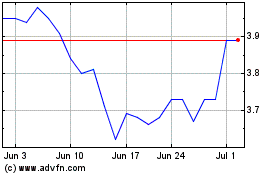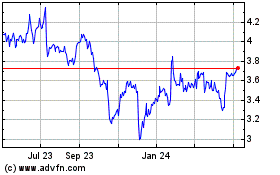Superfast 5G Fuels Turnaround at Ericsson -- WSJ
October 19 2018 - 3:02AM
Dow Jones News
By Stu Woo
This article is being republished as part of our daily
reproduction of WSJ.com articles that also appeared in the U.S.
print edition of The Wall Street Journal (October 19, 2018).
The push to build new 5G networks is finally paying off for the
world's telecom-equipment makers.
Ericsson AB, the Swedish industry giant, reported its first
profit in nine quarters, beating investor expectations and sending
its shares sharply higher Thursday. The company cited strong demand
from North American carriers for cellular-tower electronics and
related equipment. The gear is needed to roll out 5G, a new version
of mobile-network technology that promises superfast
connections.
Nokia Corp., which reports its third-quarter results next week,
has also said that it expects 5G rollouts to help boost the
telecom-equipment market in the second half of 2018.
The payoff comes after more than two years of stagnant sales,
profit warnings, layoffs and management change at the world's two
big Western telecom-equipment makers. After carriers around the
world finished rolling out all the gear needed to build today's 4G
networks, they sharply curtailed purchases. Meanwhile, two rising
Chinese competitors, Huawei Technologies Co. and ZTE Corp., offered
cheaper products in many of the world's fastest-growing
markets.
Ericsson and Nokia have been waiting a while for the
long-expected 5G sales boost, and it is unclear how sustained it
might be. Telecom-equipment makers and wireless carriers haven't
yet finalized the details of how the technology will work, and
different regions may have different standards. Some executives are
skeptical about the network's real potential.
AT&T Inc. and Verizon Communications Inc. are racing to
introduce 5G in certain cities before the year's end. Last month,
T-Mobile US Inc. agreed on a $3.5 billion deal to buy 5G equipment
and services from Ericsson. Cheering the 5G race from the sidelines
is the Trump administration. Some officials have said the country
must deploy widespread 5G, before China does, to maintain an
economic and technological edge.
"5G is becoming a commercial reality," Ericsson Chief Executive
Borje Ekholm told reporters and analysts Thursday. The company's
stock was trading almost 6% higher in the early afternoon in
Europe. "It's not about what, if and when -- it's actually
today."
5G is expected to be 100 times faster than current wireless
networks. It promises to be speedy enough to enable
near-instantaneous movie downloads and new technologies such as
self-driving cars. It can also handle many more connected devices
and could enable the Internet of Things -- the idea that everyday
objects like sneakers and heart monitors are web-connected.
That has triggered an arms race of sorts between the U.S. and
China over deploying the technology.
The competition is now playing out in sales for companies like
Ericsson.
"We see North America pushing ahead very fast, leading the way
today, followed by northeast Asia, where we also see a quite heavy
push into 5G, " Mr. Ekholm said Thursday.
Ericsson said it earned 2.7 billion Swedish kronor ($301
million) in the third quarter, compared with a loss of 3.5 billion
kronor in the same quarter a year earlier. Sales grew 9% to 53.8
billion kronor, up from 49.4 billion kronor a year earlier.
The strong sales softened the blow from another surprise:
Ericsson said it would likely incur a "material" fine, in addition
to possible other penalties, in a long-running probe by U.S.
investigators.
Ericsson said in 2013 that the Securities and Exchange
Commission was investigating the company. In 2016, it said it was
cooperating with U.S. authorities in an investigation related to
the Foreign Corrupt Practices Act, aimed at punishing bribery.
Ericsson said the probes go back to practices beginning in 2007.
Mr. Ekholm said Ericsson had shared with authorities the results of
an internal investigation, which found business-ethics breaches and
has resulted in the departure of 50 employees. He declined to
comment on which countries were involved and said it was too early
to say how the company might settle with the U.S. government.
That lingering probe, and the sales drought over the past few
years, have pressured Ericsson. It has laid off about 20,000
employees over the past two years as it dealt with massive
losses.
Since Mr. Ekholm became chief executive in January 2017,
Ericsson focused on its core business of making telecom equipment.
He said Thursday the company was continuing to cut costs and was on
track to complete a turnaround by a 2020 target.
Write to Stu Woo at Stu.Woo@wsj.com
(END) Dow Jones Newswires
October 19, 2018 02:47 ET (06:47 GMT)
Copyright (c) 2018 Dow Jones & Company, Inc.
Nokia (NYSE:NOK)
Historical Stock Chart
From Mar 2024 to Apr 2024

Nokia (NYSE:NOK)
Historical Stock Chart
From Apr 2023 to Apr 2024
